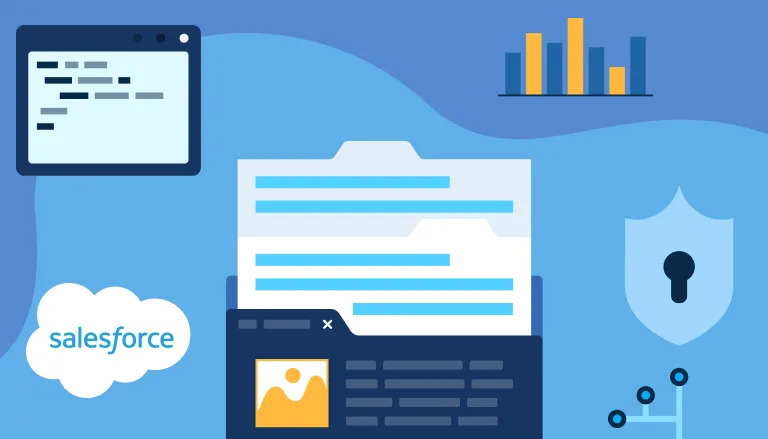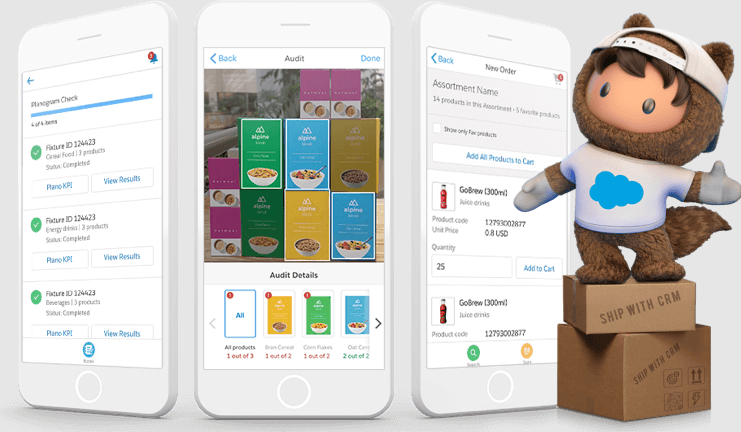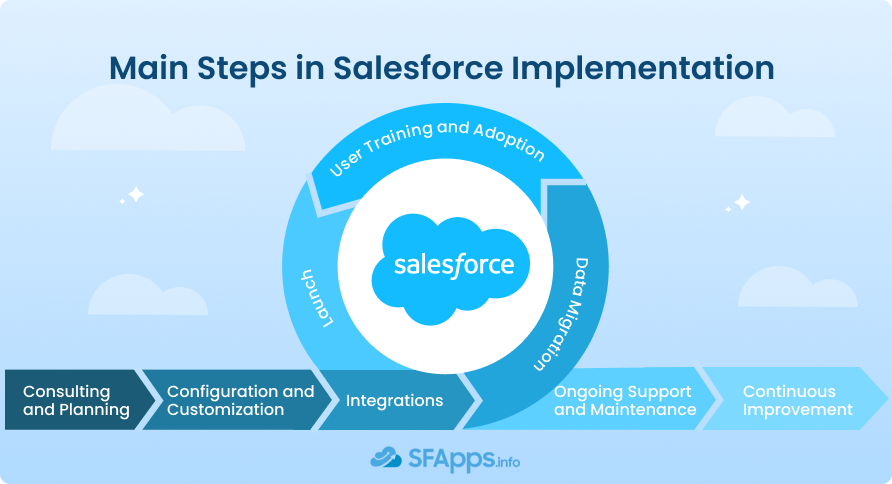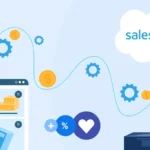
Introduction to Salesforce Consumer Goods CRM
Are you looking to streamline customer visit planning? Want to check inventory levels and reorder products swiftly and efficiently, all while reducing the time to see a return on investment? Let us introduce the Consumer Goods Cloud — a solution that integrates sales, marketing, and retail data, effectively digitizing your business processes. Reach out to the latest Salesforce Retail Cloud Implementation Guide for insights into Salesforce Retail Implementation.
Insight:
Based on the Salesforce research Consumer Goods and the Great B2B Digital Acceleration,
nearly all consumer goods companies, 99% to be exact, have rapidly advanced their digital transformation efforts in the B2B route-to-market strategy.
Salesforce has developed the Consumer Goods Cloud as a pioneering CRM tool tailored to the digital transformation needs of the consumer goods sector. This platform simplifies and digitizes operations, making it easier than ever to manage your business.
The implementation of this cloud solution marks a significant step towards digital transformation, empowering businesses to achieve higher efficiency and foster stronger customer connections. By integrating various aspects of business operations, Salesforce Consumer Goods Cloud enables companies to deliver personalized customer experiences, optimize their supply chains, and drive sales growth.

Image Source: Salesforce, products, Consumer Goods Cloud
Introduced in 2019, the Salesforce Consumer Goods Cloud has revolutionized the consumer goods industry, affecting everything from retail channels to the final consumer. This platform has transformed traditional models, leading to a more interconnected and customer-focused approach.
The Consumer Goods Cloud equips field representatives with essential data that aid in intelligent decision-making, optimizing operations, improving the in-store experience, and boosting revenue.
Since its launch, the platform has adapted to the shifting demands of the consumer goods sector, establishing itself as a critical asset in a fast-paced market.
Understanding the Basics of Salesforce Comer Goods Cloud
Salesforce Consumer Goods Cloud is designed specifically for consumer goods companies, offering robust tools that streamline operations and enhance engagement across the supply chain. At its core, this cloud-based platform provides essential functionalities that help manage key aspects of business operations more efficiently.
- Account Management: Central to the platform is its ability to manage customer accounts comprehensively. Companies can track interactions, manage contacts, and view sales history in one centralized location, which enhances the ability to make data-driven decisions quickly.
- Sales Management: The platform supports sales teams with tools to plan visits, optimize routes, and manage orders on the go. This is particularly beneficial for field representatives who need access to real-time data and analytics to maximize their productivity during client visits.
- Retail Execution: With features designed for in-store activities, Salesforce Consumer Goods Cloud helps ensure that products are stocked appropriately, promotions are executed correctly, and pricing strategies are applied consistently across all retail locations.
- Integration with Salesforce Ecosystem: One of the most significant advantages of the Consumer Goods Cloud is its seamless integration with the broader Salesforce ecosystem. This connectivity allows for the synchronization of data across different Salesforce applications, enhancing the overall functionality and user experience.
Understanding these foundational elements is crucial for businesses preparing to implement Salesforce Consumer Goods Cloud. They set the stage for a deeper exploration into preparation, strategy, and customization options that can further enhance operational efficiencies and customer satisfaction.

Implementation Steps for Salesforce Consumer Goods Cloud
Implementing the Salesforce Consumer Goods Cloud involves a structured approach to set up and optimize the platform for retail execution and customer management. Here are the key steps to guide you through the process:
- Define Customer Data and Hierarchy: Start by mapping out your customer data. This includes setting up a detailed hierarchy of customer accounts that categorizes various entities like trade organizations, stores, and wholesalers. This hierarchical structure helps in managing customer relationships and streamlining the sales process.
- System Setup and Configuration: Configure the necessary modules in the Consumer Goods Cloud. This involves enabling features like retail execution, setting up accounts, and defining roles and permissions. Ensure your system aligns with your organizational structure and sales processes.
- Planning and Execution: Strategically plan your retail execution to manage key aspects such as product assortments, planograms, promotions, and store visits. Utilize tools like Salesforce Maps for optimized routing and location details, and leverage platform features like Lightning App Builder and Flows to customize pages and automate tasks.
- Data Integration and Management: Integrate your existing data with the Consumer Goods Cloud. This step is crucial for ensuring that all relevant customer and sales data is accessible within the platform. This integration supports efficient management of sales territories, customer engagements, and performance tracking.
- Training and Enablement: Conduct comprehensive training for your team to familiarize them with the new system. This includes training on how to use the mobile app, both online and offline, to ensure field reps can effectively manage their tasks and customer interactions even in areas with poor internet connectivity.
Insight:
Did you know that you can integrate your Salesforce with #1 Cloud ERP? Reach out about NetSuite Salesforce Integration for insights, steps for implementation, and much more.
- Go Live and Monitor: Once everything is set up and your team is trained, go live with the system. Monitor the implementation closely to address any issues promptly. Utilize the analytics and reporting tools within Consumer Goods Cloud to assess performance and make informed adjustments.
By following these steps, you can ensure a smooth implementation of Salesforce Consumer Goods Cloud, enabling enhanced sales management and improved customer relationships.
Leveraging AI and Analytics in the Salesforce Consumer Goods Cloud
The implementation of Salesforce Consumer Goods Cloud is not complete without integrating its powerful AI capabilities, primarily through Salesforce Einstein. This section explores how leveraging AI and analytics can significantly enhance retail industry operations by enabling smarter decision-making and more personalized customer engagements.
Predictive Analytics
- Sales Forecasting: Use Einstein AI to analyze historical sales data and market trends to predict future sales outcomes. This predictive capability helps retailers make informed inventory and marketing decisions to avoid stockouts and optimize sales strategies.
- Customer Insights: Einstein AI can also segment customers based on purchasing behavior and preferences, providing sales teams with valuable insights to tailor marketing campaigns and improve customer engagement strategies.
Operational Efficiency
- Route Optimization: For field sales teams, AI-driven route optimization ensures that sales representatives can plan their store visits more efficiently, saving time and reducing costs. This optimization considers factors like traffic, store opening hours, and priority accounts.
- Inventory Management: AI can predict stock levels required at different store locations, helping manage inventory more effectively and reduce the risk of overstocking or understocking.
Personalized Customer Experiences
- Customized Promotions: By understanding customer buying patterns and preferences, AI enables the creation of personalized promotions that are more likely to convert, enhancing customer satisfaction and loyalty.
- Real-Time Recommendations: During customer interactions, sales reps can leverage AI-driven recommendations to offer products and services that meet the customer’s specific needs and preferences, enhancing the chances of a sale.
Enhanced Reporting and Analytics
- Dashboard and Visualization: Salesforce Consumer Goods Cloud offers comprehensive dashboards powered by Einstein Analytics, providing real-time visibility into key performance indicators (KPIs), market trends, and consumer behavior. These insights are pivotal for quick and accurate decision-making.
- Feedback Loop: AI systems continually learn from new data, meaning the insights and recommendations become more accurate over time, creating a feedback loop that continually enhances business operations.
Incorporating AI into the Salesforce Consumer Goods Cloud empowers retailers to not only respond more adeptly to market changes but also proactively shape their strategies to meet anticipated conditions. This integration of AI and analytics into the implementation strategy positions businesses to harness the full potential of digital transformation in retail.

Image Source: Salesforce, products, Consumer Goods Cloud
Consumer Goods Cloud Pricing
Salesforce Consumer Goods Cloud offers a variety of pricing plans tailored to different needs within the retail and consumer goods sectors. Here’s an overview of the pricing for different modules:
Consumer Goods Cloud for Sales
- Price: Starts at $225 USD per user per month, billed annually.
- Features: This plan provides tools to drive sales productivity by offering a unified space for sales teams to plan and collaborate.
Consumer Goods Cloud for Trade Promotion Management
- Price: Specific pricing details are available upon contacting a Salesforce account executive as the cost depends on market revenue and the number of users.
- Features: This module focuses on improving trade promotion effectiveness through performance insights and fund management visibility.
Consumer Goods Cloud for Retail Execution
Accelerate growth from planning to execution with tailored Salesforce implementation solutions in retail for various roles within the retail execution framework:
| Role / Plan | Description | Pricing |
| Contractor | Designed for external contractors, this plan focuses on visit routing and onsite audits. | $75 USD / per / month |
| Merchandiser | Optimize field execution capabilities for merchandising representatives to enhance in-store presence and compliance. | $100 USD / per / month |
| Field Sales | Elevate core features to drive significant business growth, geared toward field sales professionals. | $175 USD / per / month |
| Strategic Sales | Supercharge productivity and leverage advanced AI tools to drive sales, ideal for high-level sales strategists. | $325 USD / per / month |
These plans are designed to cater to different levels of needs within the retail sector, from basic audit functions to strategic sales initiatives leveraging artificial intelligence. This structured pricing allows businesses to scale their Salesforce implementation according to specific roles and functions within their sales teams.
Consumer Goods Cloud for Service Pricing
- Price: Starts at $225 USD per user per month, billed annually.
- Features: This service-focused module aims to grow customer satisfaction and revenue, providing extensive service capabilities.
For businesses looking for more comprehensive solutions, Salesforce also offers bundles known as Consumer Goods Cloud Suites, which can lead to cost savings compared to purchasing individual solutions separately. The exact savings and terms can be discussed with Salesforce sales representatives.
FAQ: Salesforce Consumer Goods Cloud Implementation
What are common Salesforce implementation challenges in retail?
Retailers often face challenges such as integrating Salesforce with existing legacy systems, managing data quality during migration, and ensuring user adoption across diverse teams. Other issues include tailoring Salesforce to specific retail workflows and processes, and training staff to utilize new tools effectively within their daily operations.
How can businesses overcome these Salesforce implementation challenges?
Effective strategies include thorough planning and requirement mapping, choosing the right Salesforce partners for implementation, and focusing on comprehensive training programs. It’s also crucial to engage end-users early in the process through pilot testing and feedback loops to ensure the system meets their needs.
How can businesses successfully implement Salesforce Consumer Goods Cloud?
The Salesforce Consumer Goods Cloud implementation guide outlines essential steps like setting objectives, configuring data models, enabling mobile tools, integrating systems, and training users to ensure a smooth rollout.
What are the key benefits of implementing Salesforce Consumer Goods Cloud in retail?
Salesforce Consumer Goods Cloud helps retailers enhance sales productivity, improve inventory and order management, and offer better customer service. The platform enables more personalized customer interactions through data-driven insights and supports efficient retail execution and trade promotion management.
How does Salesforce support retail execution?
Salesforce Consumer Goods Cloud offers features such as route optimization for field reps, retail audit capabilities, and tools for efficient in-store execution. This supports retailers in maintaining consistent store conditions, managing promotions effectively, and ensuring products are optimally stocked and displayed.
What should retailers consider when choosing between different Salesforce Consumer Goods Cloud pricing plans?
Retailers should consider their specific needs such as the scale of their operations, the complexity of their trade promotions, and the level of retail execution required. If using Consumer Goods Cloud for service pricing, they should also evaluate whether pricing tools and features are included in the plan. Budget constraints and the expected return on investment are critical factors. Comparing the features and limitations of each pricing tier helps ensure the selected plan meets both operational needs and strategic goals.
Final Thoughts
The journey of implementing Salesforce Consumer Goods Cloud is a strategic endeavor that enhances a company’s ability to manage and optimize consumer interactions, sales productivity, trade promotions, and retail execution. This comprehensive guide has outlined a path from initial understanding through to advanced features, pricing models, and ongoing maintenance.
- Strategic Implementation: The implementation of Salesforce Consumer Goods Cloud should be viewed not just as a technical upgrade but as a strategic enhancement to the business. It requires thorough planning, a clear understanding of the available modules, and a commitment to adapting the platform to the company’s specific needs.
- Customization and Training: Success in this implementation heavily depends on customization to fit specific business processes and comprehensive training for all users. Ensuring that the workforce is comfortable and proficient with the new system is paramount for maximizing its benefits.
- Evolving with the Platform: Salesforce is continuously evolving, adding new features and capabilities. Businesses must stay proactive about integrating these updates to keep the system aligned with modern practices and technologies.
- Cost Consideration: Understanding the pricing structure, as detailed in the guide, allows businesses to budget appropriately and select the modules and scales that best meet their needs without unnecessary expenditure.
By embracing these strategies, companies can ensure a smooth transition to Salesforce Consumer Goods Cloud, positioning themselves to drive growth, improve customer satisfaction, and maintain a competitive edge in the fast-paced consumer goods market.

Dorian is a 6X Certified Salesforce Developer and Administrator with a start in the IT world as a CRM Admin in 2020. Since diving into Salesforce in 2021 via Trailhead and Focus on Force, he has achieved a Ranger Rank, earned several Superbadges, and bagged certifications including the Salesforce Certified Administrator, Platform App Builder, Associate and Platform Developer I by 2023. In 2024 he also became Salesforce Certified AI Associate and earned Certified AI Specialist Certification in 2025. Dorian is very keen on continuous learning, always looks for fresh ways to improve his knowledge. He enjoys running, boxing, kickboxing and reading diverse kinds of books in his free time.


 Previous Post
Previous Post Next Post
Next Post
In my experience working with this platform, it has significantly transformed our retail operations. We utilized Salesforce Consumer Goods Cloud to streamline our field sales activities, providing real-time insights into stock levels and optimizing our retail execution. The AI-driven features, particularly route optimization and predictive analytics, have been game-changers, allowing our team to enhance productivity and deliver a more personalized customer experience.